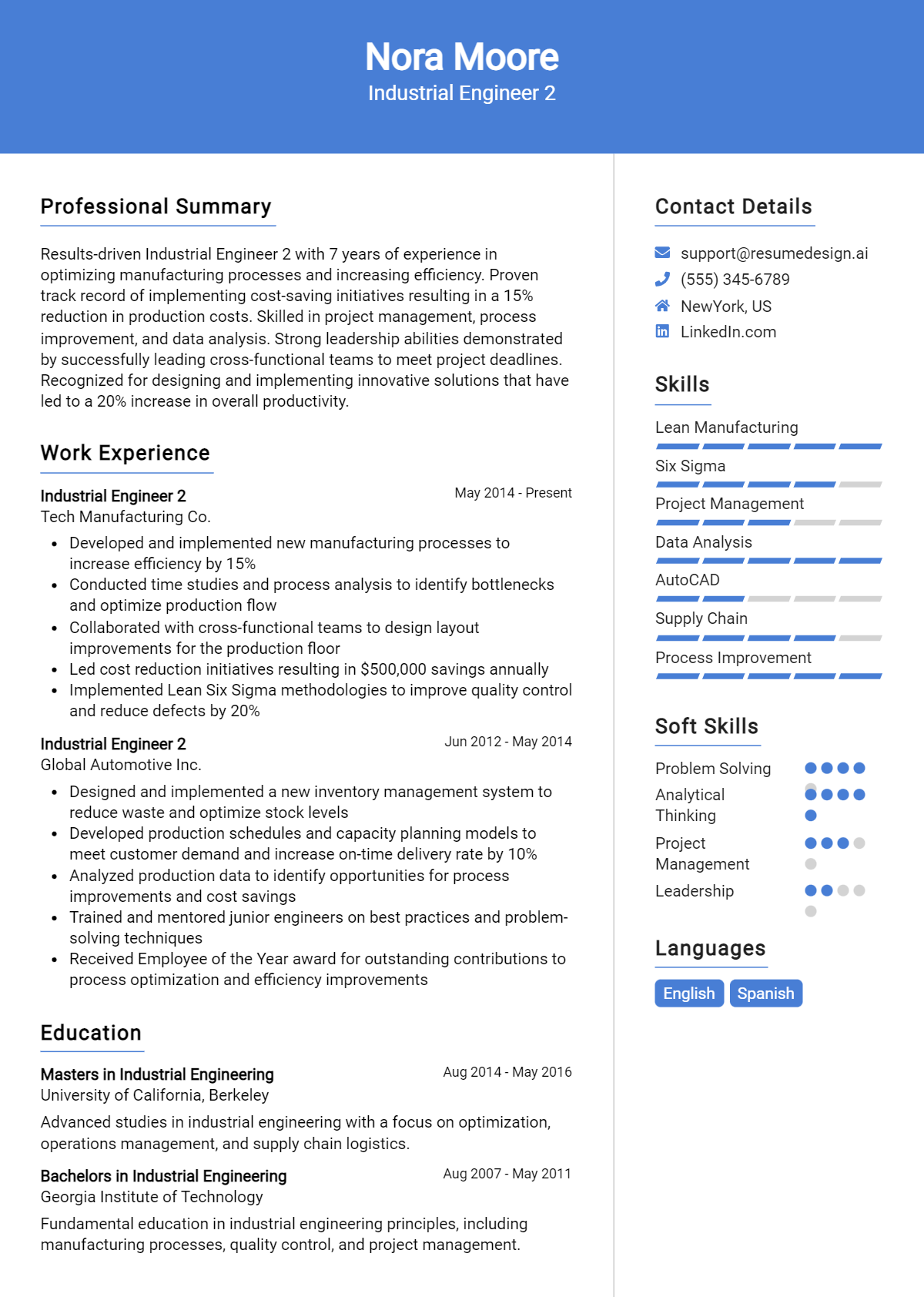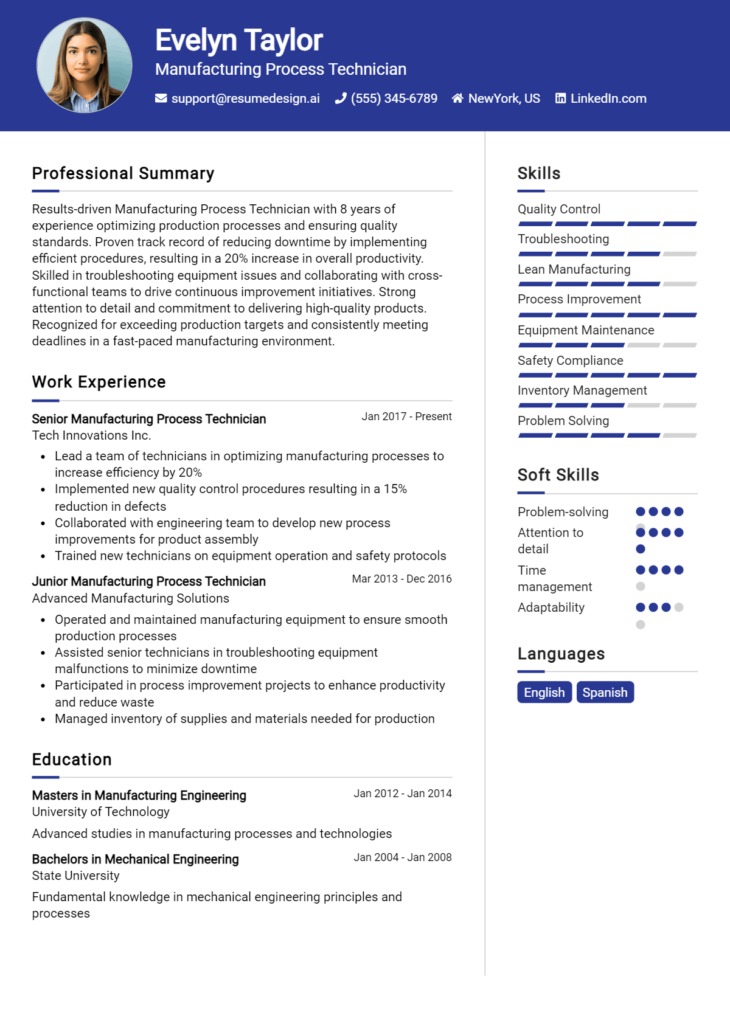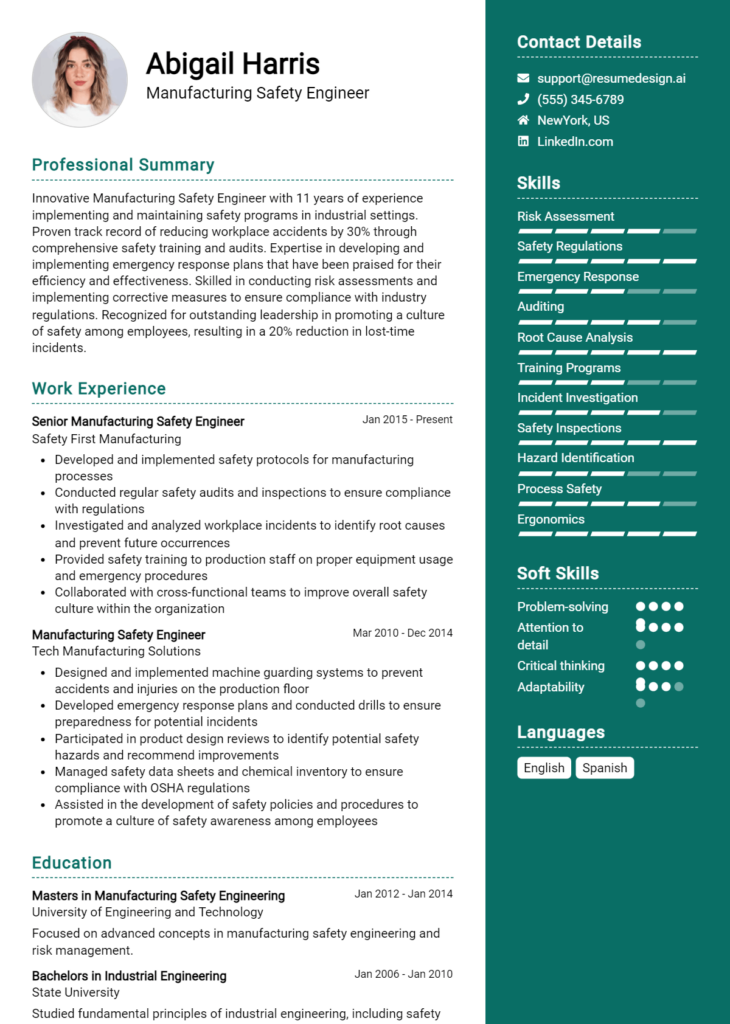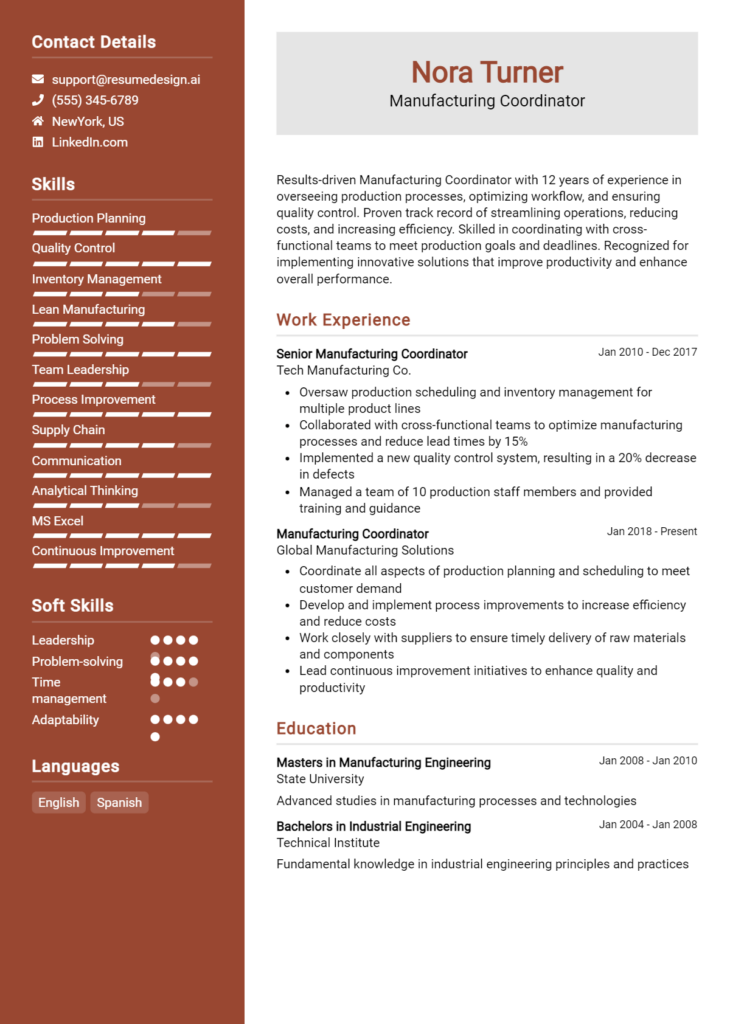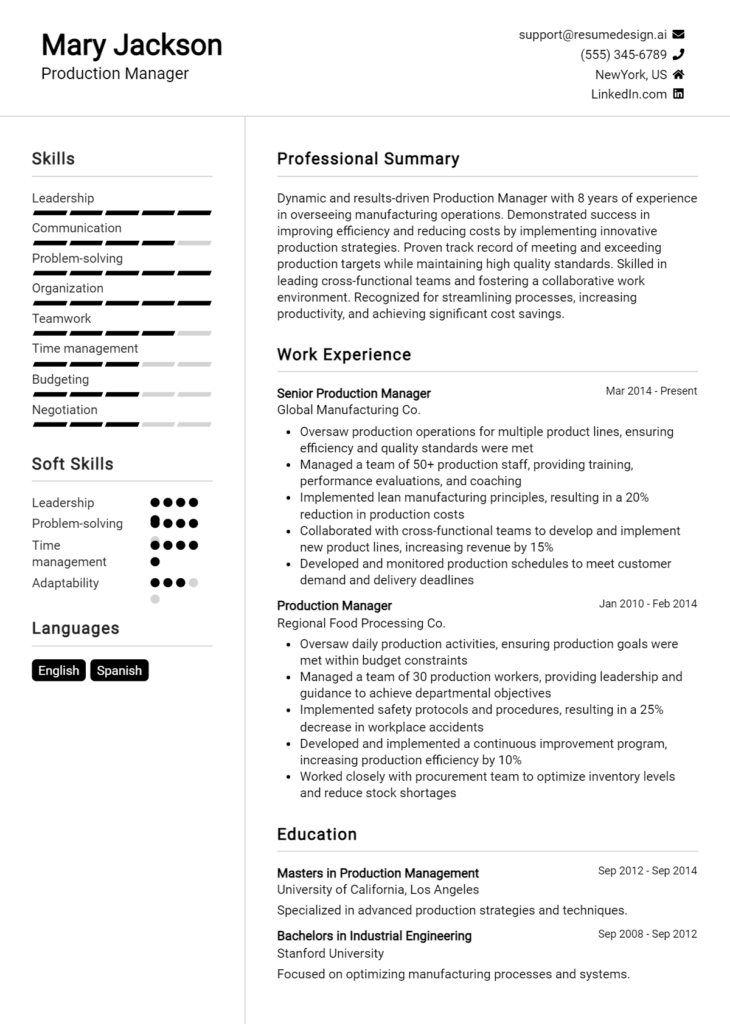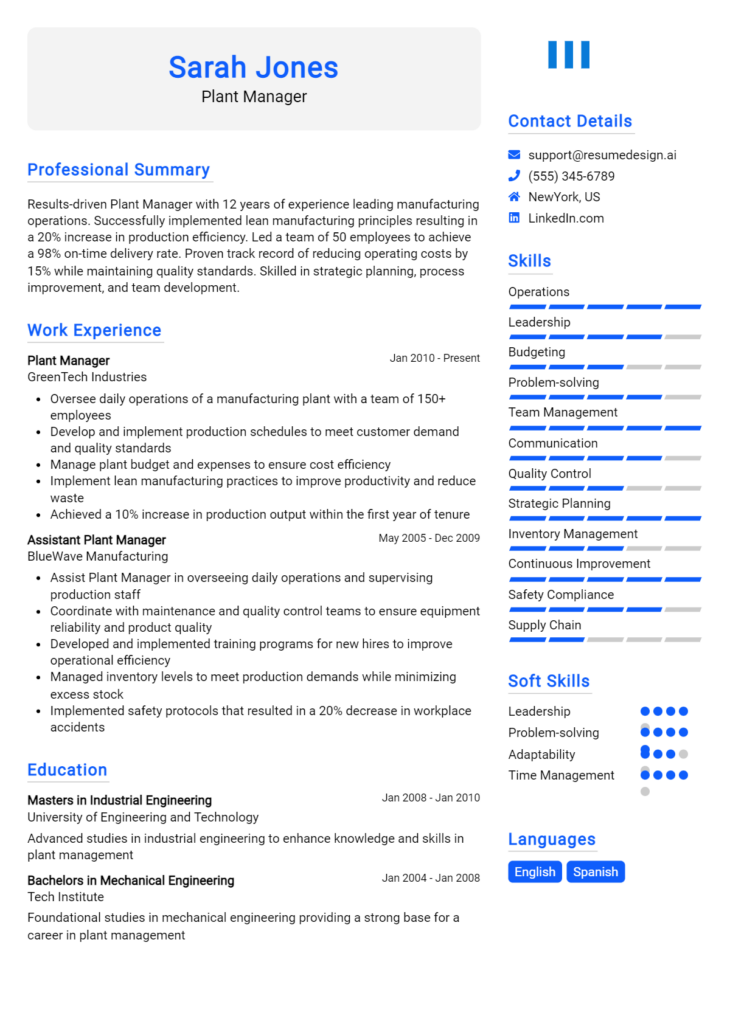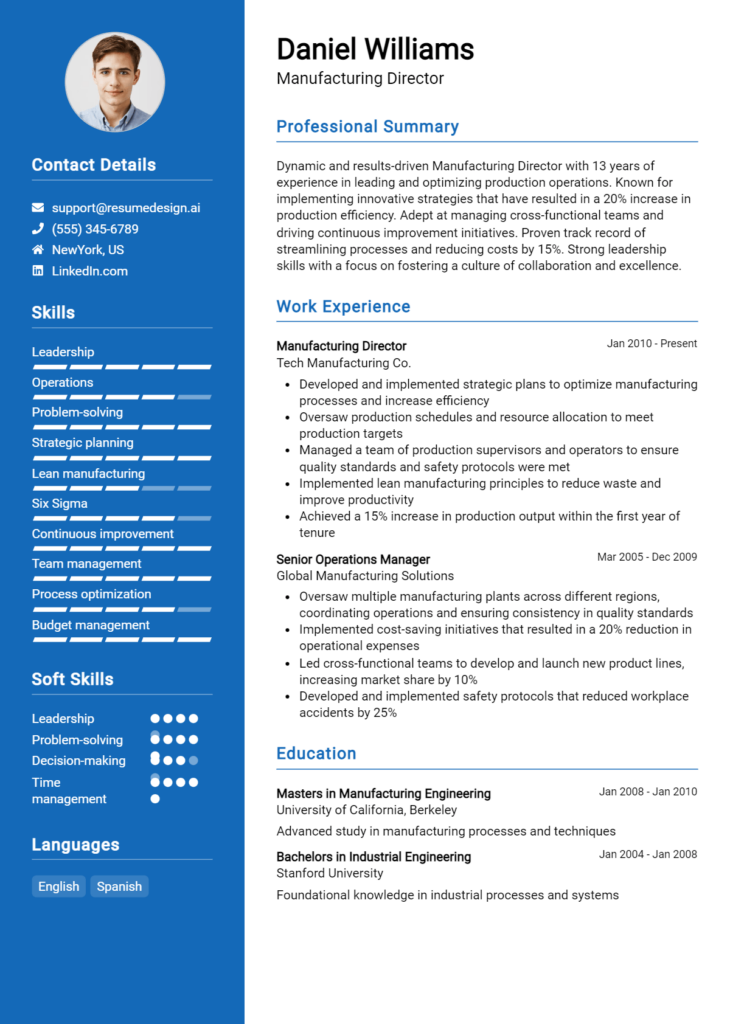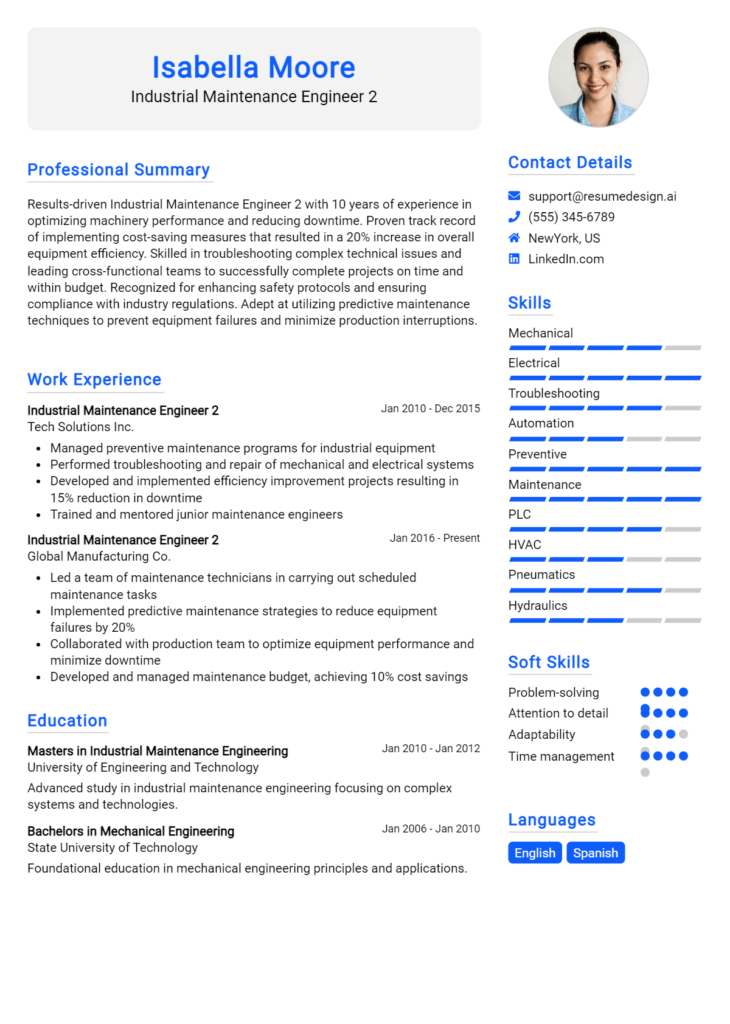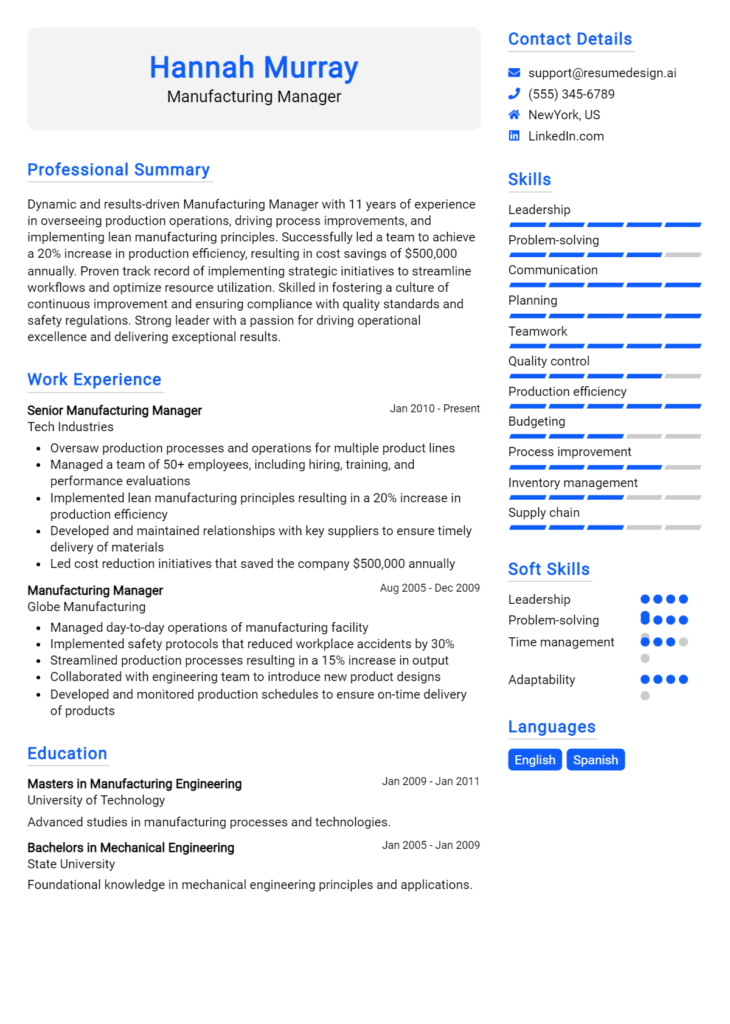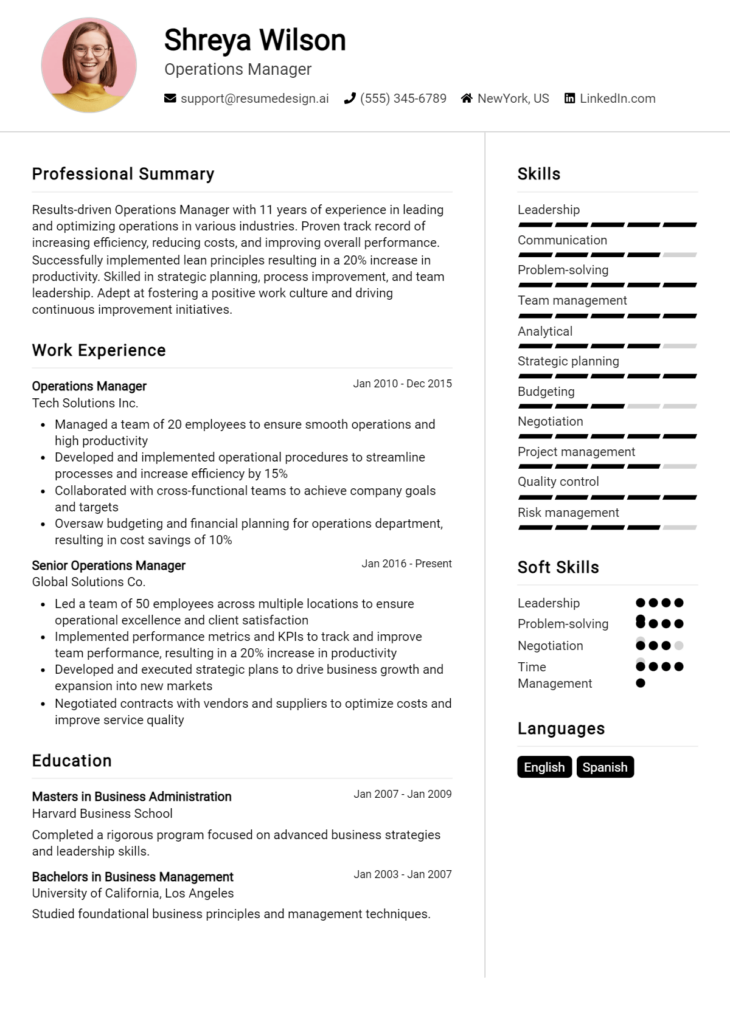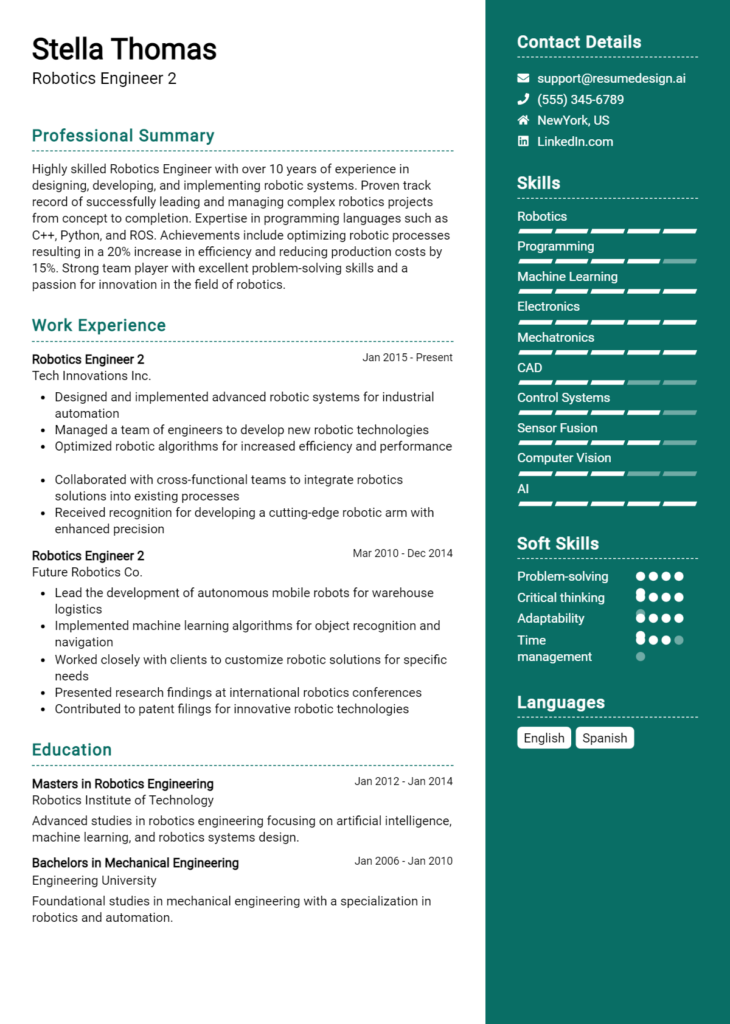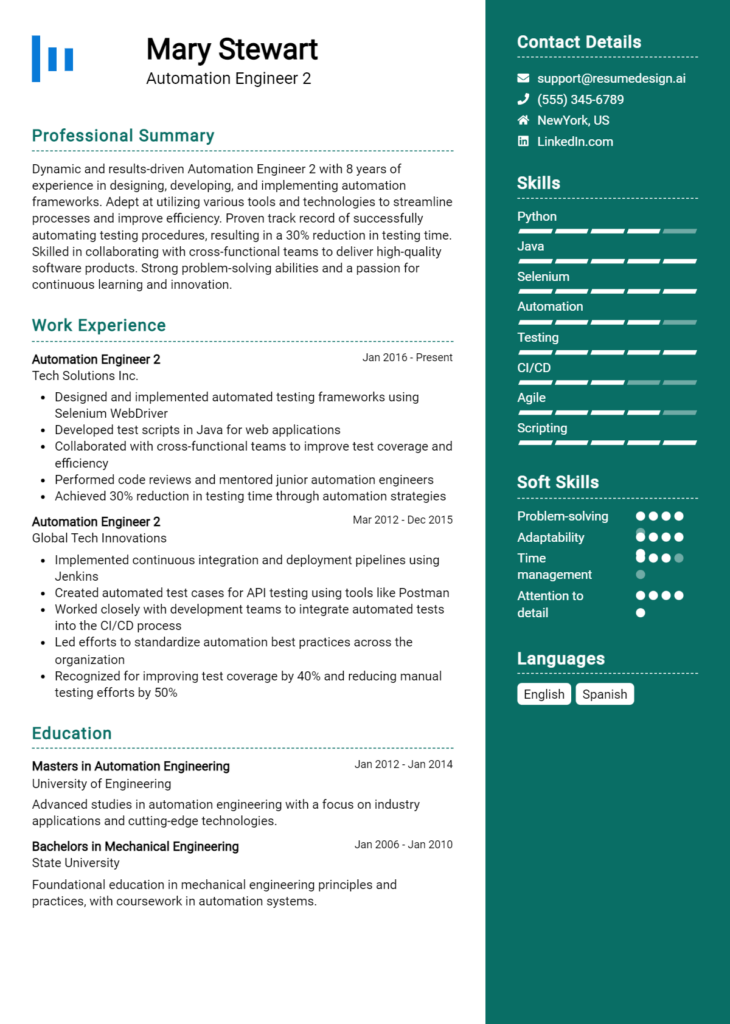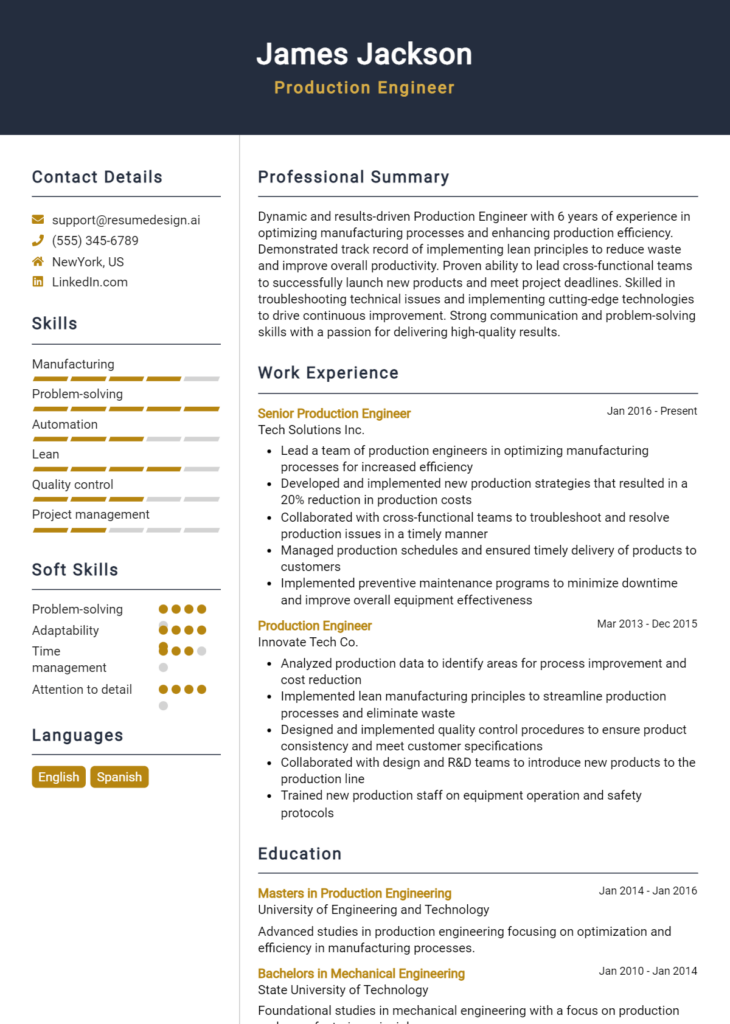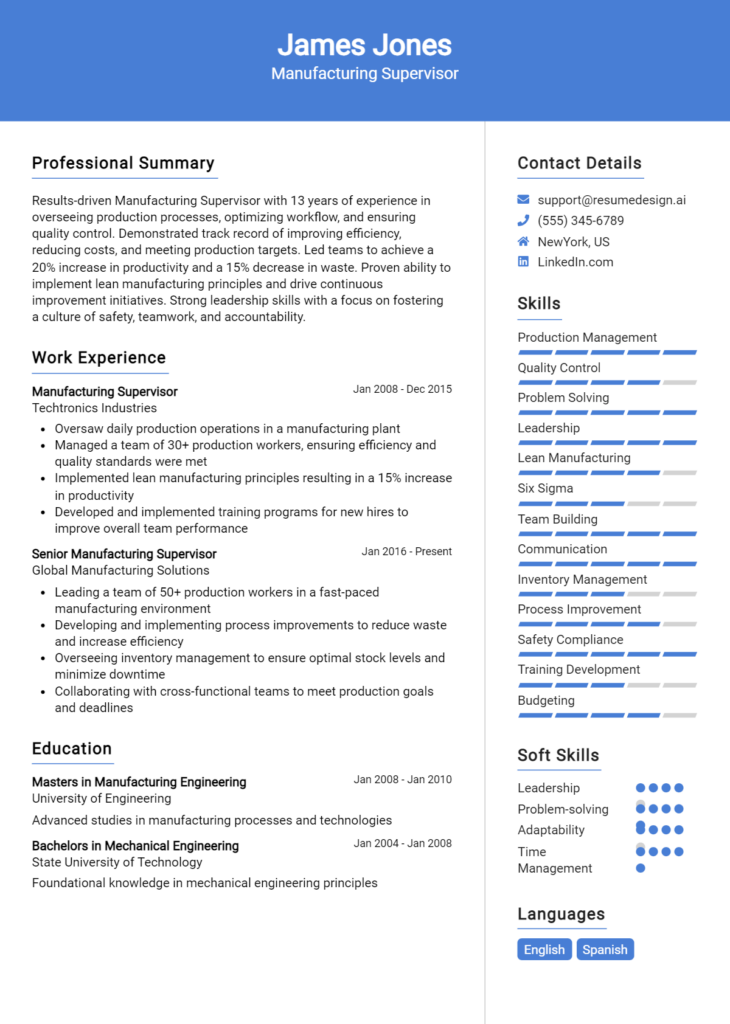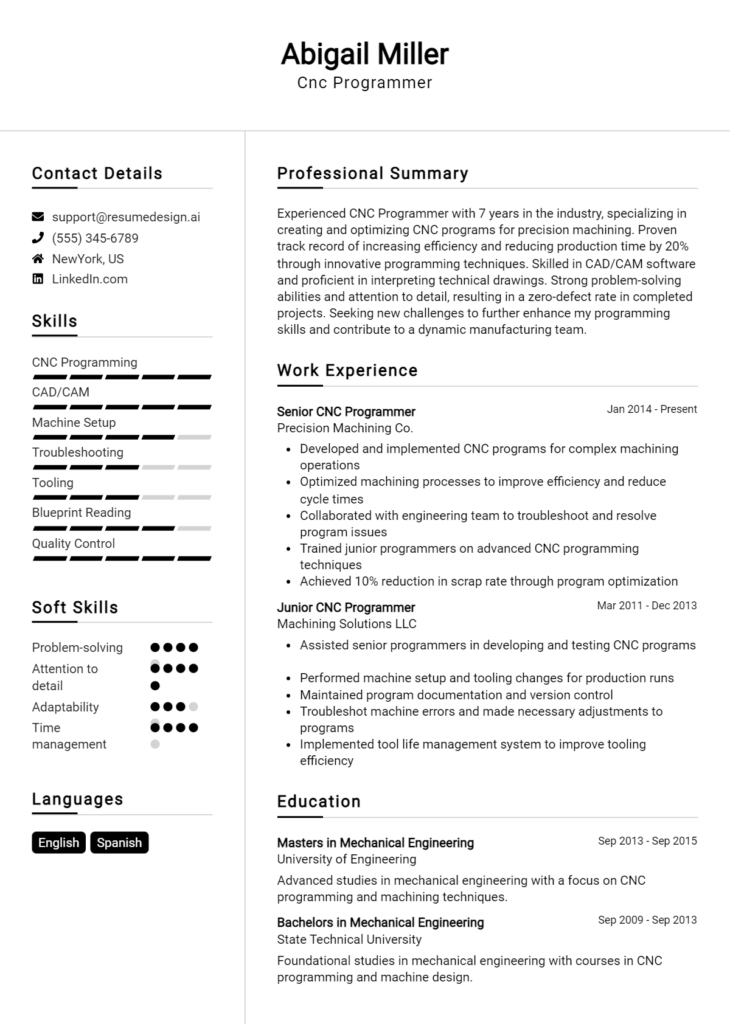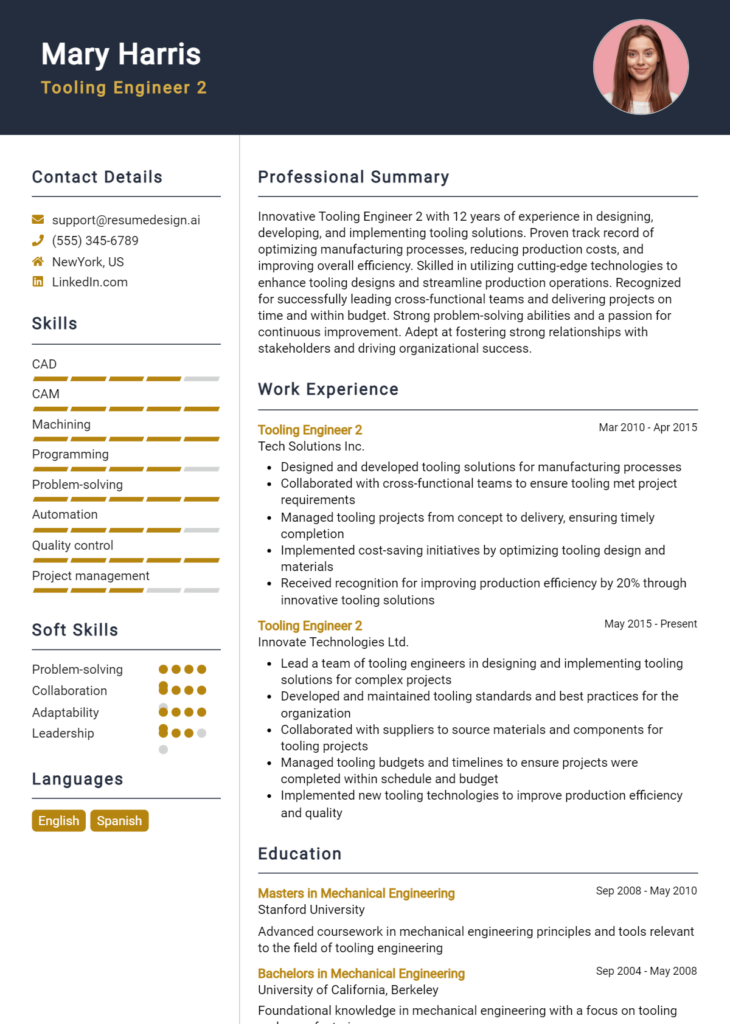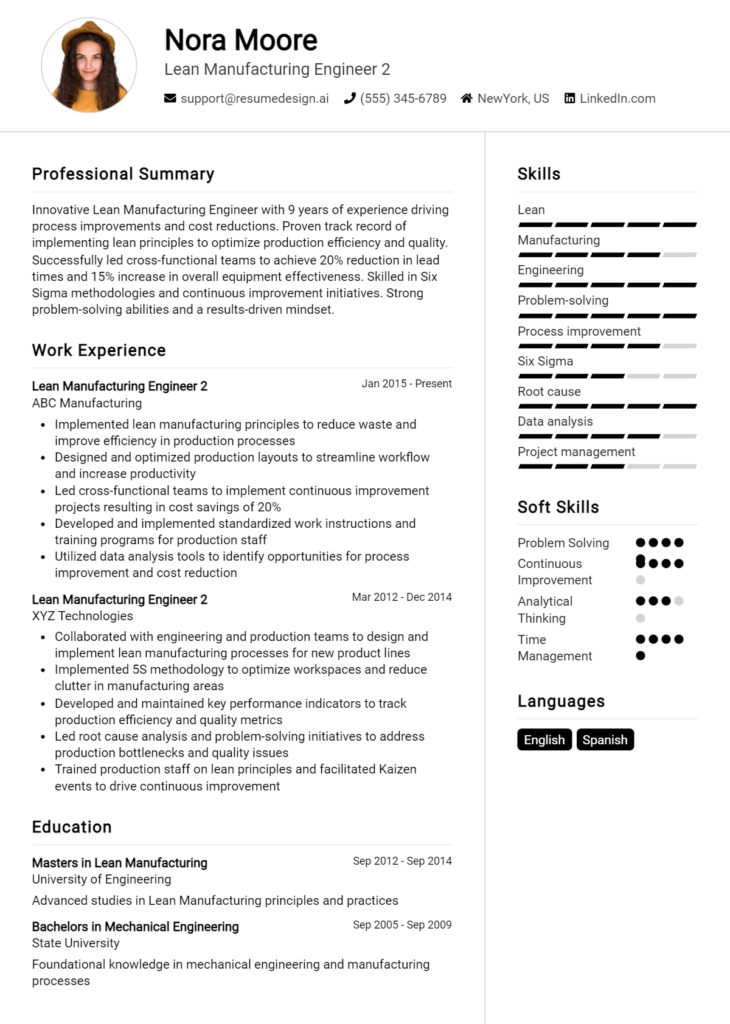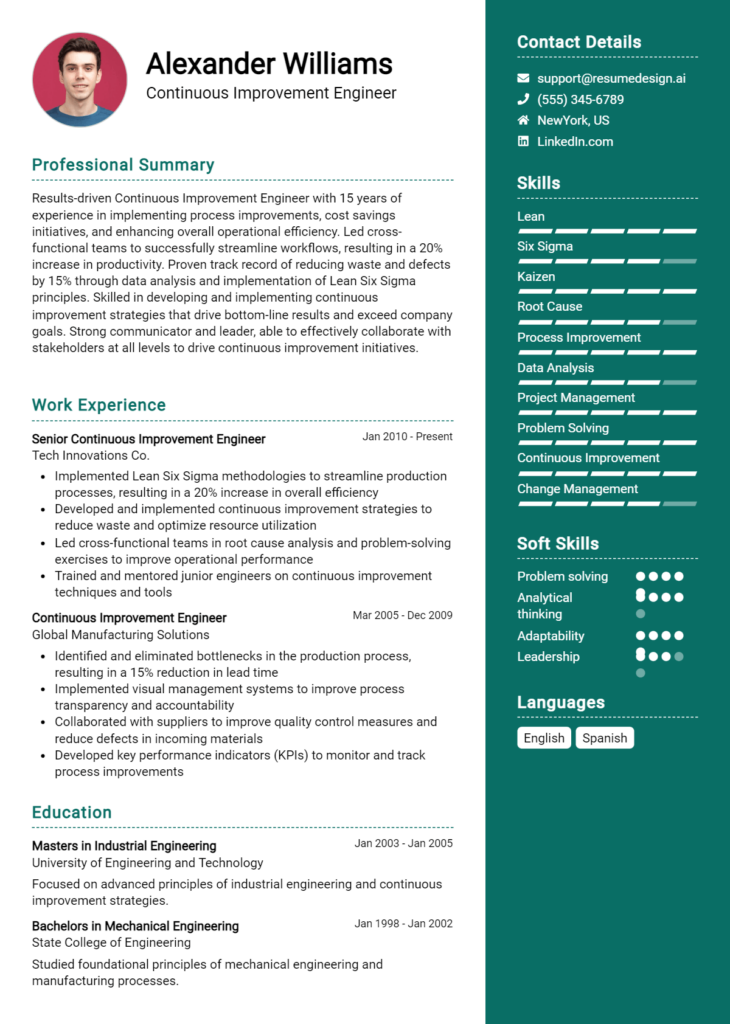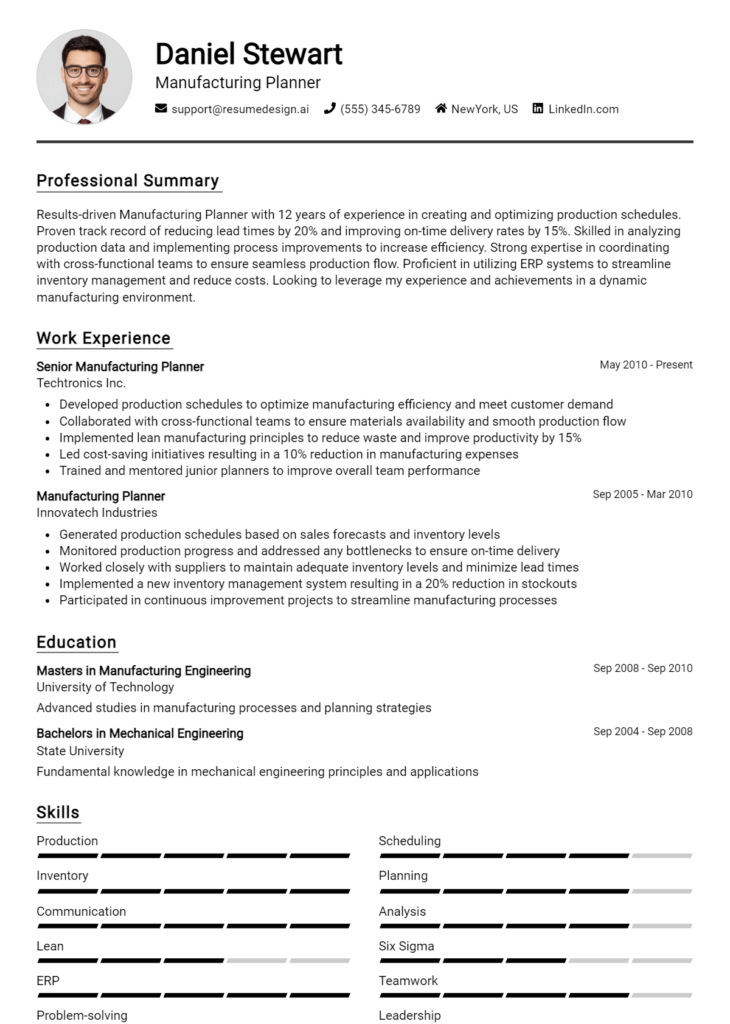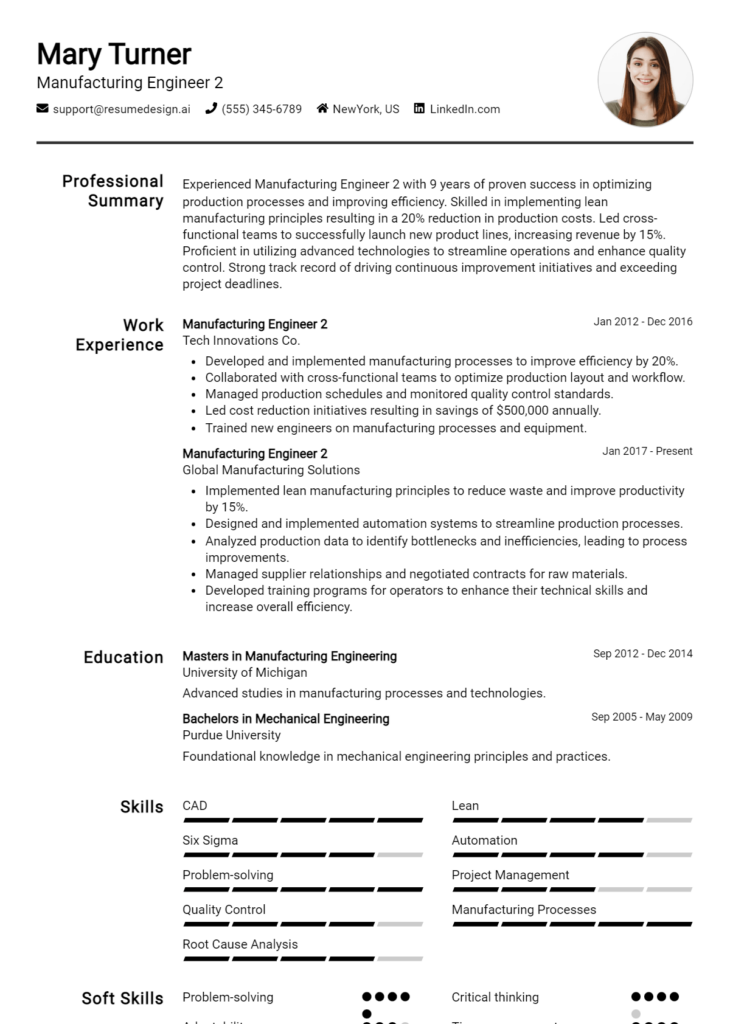Industrial Engineer Core Responsibilities
Industrial Engineers play a crucial role in optimizing complex systems and processes across various departments. They are responsible for analyzing workflows, enhancing productivity, and implementing cost-effective solutions. Essential skills include technical proficiency in engineering principles, strong operational insights, and advanced problem-solving abilities. By fostering collaboration between departments, Industrial Engineers help align organizational goals with efficient practices. A well-structured resume highlighting these qualifications is vital for showcasing an applicant's potential impact on the company's success.
Common Responsibilities Listed on Industrial Engineer Resume
- Conducting time and motion studies to improve efficiency
- Developing process improvement strategies
- Analyzing production schedules and workflow
- Collaborating with cross-functional teams
- Utilizing statistical methods to solve operational problems
- Implementing quality control measures
- Designing layouts for manufacturing and assembly
- Evaluating the cost-effectiveness of processes
- Creating documentation for engineering processes
- Training staff on new procedures and systems
- Monitoring equipment and production performance
- Utilizing software tools for simulation and modeling
High-Level Resume Tips for Industrial Engineer Professionals
In today's competitive job market, a well-crafted resume is vital for Industrial Engineer professionals seeking to make a lasting impression on potential employers. As the first touchpoint in the hiring process, your resume serves as a marketing tool that showcases not only your technical skills but also your achievements and contributions in previous roles. A strong resume can set you apart from other candidates, making it essential to highlight both your industry knowledge and relevant experience effectively. This guide aims to provide practical and actionable resume tips specifically tailored for Industrial Engineer professionals, ensuring you stand out in your field.
Top Resume Tips for Industrial Engineer Professionals
- Tailor your resume to match the job description, emphasizing relevant skills and experiences that align with the specific requirements.
- Include a clear and concise summary statement that highlights your career goals and what you bring to the table as an Industrial Engineer.
- Showcase your relevant experience in reverse chronological order, emphasizing job titles, company names, and dates of employment.
- Quantify your achievements with specific metrics (e.g., improved efficiency by 20%, reduced costs by $50,000) to demonstrate your impact.
- Highlight industry-specific skills such as Six Sigma, Lean Manufacturing, project management, and statistical analysis to showcase your expertise.
- Include relevant certifications (e.g., Certified Industrial Engineer, Lean Six Sigma Green Belt) to further validate your qualifications.
- Incorporate action verbs to describe your responsibilities and accomplishments, making your contributions stand out (e.g., optimized, designed, implemented).
- Use bullet points for clarity and easy readability, ensuring that key information is easily digestible for hiring managers.
- Keep the layout clean and professional, ensuring consistent formatting, font choice, and spacing throughout the document.
- Proofread your resume multiple times to eliminate any grammatical or typographical errors that could detract from your professionalism.
By implementing these tips, you can significantly improve your chances of landing a job in the Industrial Engineer field. A polished and tailored resume will not only reflect your qualifications effectively but also demonstrate your commitment to professionalism and attention to detail, attributes that are highly valued in the industry.
Why Resume Headlines & Titles are Important for Industrial Engineer
In the competitive field of industrial engineering, a well-crafted resume headline or title serves as a critical first impression for potential employers. It acts as a beacon that draws hiring managers' attention, summarizing a candidate's key qualifications in one impactful phrase. A strong headline should be concise, relevant, and directly related to the job being applied for, effectively showcasing the candidate's skills and experience. By encapsulating critical attributes in a few words, an effective headline can set the tone for the entire resume, encouraging employers to delve deeper into the candidate's qualifications.
Best Practices for Crafting Resume Headlines for Industrial Engineer
- Be concise: Limit your headline to a few impactful words that capture your essence.
- Stay relevant: Tailor your headline to match the specific role you’re applying for.
- Highlight key skills: Focus on the skills and experiences that are most valuable to the employer.
- Use action-oriented language: Start with dynamic verbs that convey confidence and capability.
- Incorporate industry keywords: Utilize terms that are common in the industrial engineering field to enhance visibility.
- Avoid jargon: Make sure your headline is understandable to those outside your specific field.
- Showcase accomplishments: If possible, include quantifiable achievements to bolster your credibility.
- Keep it professional: Ensure that the language and tone reflect a professional demeanor.
Example Resume Headlines for Industrial Engineer
Strong Resume Headlines
Results-Driven Industrial Engineer with 5+ Years of Experience in Lean Manufacturing
Certified Six Sigma Professional Specializing in Process Optimization
Innovative Industrial Engineer Focused on Sustainable Manufacturing Solutions
Experienced Industrial Engineer with Expertise in Data Analysis and Production Efficiency
Weak Resume Headlines
Industrial Engineer Looking for a Job
Engineering Professional Seeking Opportunities
The strong headlines are effective because they provide specific insights into the candidate's skills, experience, and unique value proposition, making them immediately relevant to hiring managers. In contrast, the weak headlines fail to impress due to their vagueness and lack of specificity, offering no real indication of what the candidate brings to the table or how they align with the job requirements. A compelling headline not only captures attention but also sets the stage for a more detailed exploration of the candidate's qualifications.
Writing an Exceptional Industrial Engineer Resume Summary
A resume summary is a crucial element for Industrial Engineers, as it serves as a brief introduction that captures the attention of hiring managers. A strong summary highlights key skills, relevant experience, and significant accomplishments that pertain to the job role, making it easier for employers to quickly assess a candidate’s suitability. This concise and impactful statement should be tailored to the specific job the candidate is applying for, ensuring that it resonates with the requirements outlined in the job description.
Best Practices for Writing a Industrial Engineer Resume Summary
- Quantify Achievements: Use numbers to demonstrate your impact, such as cost savings, efficiency improvements, or project completion rates.
- Focus on Relevant Skills: Highlight technical skills, software expertise, and industry knowledge that align with the job description.
- Tailor the Summary: Customize your summary for each position you apply for, using keywords found in the job posting.
- Keep it Concise: Aim for 2-4 sentences that provide a snapshot of your qualifications without overwhelming the reader.
- Showcase Problem-Solving Abilities: Mention specific challenges you have addressed and the solutions you implemented.
- Use Action-Oriented Language: Start sentences with strong action verbs to convey initiative and accomplishment.
- Include Relevant Certifications: Mention any engineering licenses, certifications, or training that enhance your qualifications.
- Highlight Team Collaboration: Emphasize your experience working in teams or leading projects, as collaboration is key in engineering roles.
Example Industrial Engineer Resume Summaries
Strong Resume Summaries
Results-driven Industrial Engineer with over 5 years of experience in optimizing manufacturing processes, achieving a 20% reduction in production costs while increasing output by 15%. Proficient in Lean Six Sigma methodologies and CAD software, skilled in cross-functional team leadership.
Detail-oriented Industrial Engineer with a proven track record of enhancing operational efficiency in a high-volume production environment. Successfully led a project that streamlined workflow processes, resulting in a 30% increase in productivity and saving $50,000 annually.
Dynamic Industrial Engineer with expertise in supply chain management and process improvement. Spearheaded a project that decreased lead time by 25% through effective inventory management and vendor collaboration.
Weak Resume Summaries
Industrial Engineer with some experience looking for a challenging position. I am a team player and have worked on several projects.
Motivated engineer eager to contribute to a company’s success. I have skills in engineering and am interested in improving processes.
The summaries considered strong demonstrate quantifiable results, specific skills, and direct relevance to the Industrial Engineer role, making it easy for hiring managers to understand the candidate's value. In contrast, the weak summaries lack detail, fail to convey measurable accomplishments, and come across as generic, providing little insight into the candidate's capabilities or fit for the position.
Work Experience Section for Industrial Engineer Resume
The work experience section of an Industrial Engineer resume is critical as it serves as a testament to the candidate's technical skills, leadership capabilities, and their aptitude for delivering high-quality products. This section not only highlights the specific roles and responsibilities undertaken by the candidate but also illustrates their ability to manage teams effectively and implement engineering solutions that drive efficiency and productivity. By quantifying achievements and aligning experiences with industry standards, candidates can create a compelling narrative that showcases their value to potential employers.
Best Practices for Industrial Engineer Work Experience
- Use action verbs to describe your responsibilities and achievements.
- Quantify results whenever possible, such as cost savings, efficiency improvements, or production increases.
- Highlight specific technical skills and tools used in past roles.
- Include examples of successful team collaboration and leadership experiences.
- Align your experiences with the requirements and standards of the industry.
- Focus on relevant projects that demonstrate your problem-solving abilities.
- Tailor your work experience to match the job description of the position you are applying for.
- Keep descriptions concise and impactful, avoiding jargon that may not be understood by all readers.
Example Work Experiences for Industrial Engineer
Strong Experiences
- Led a cross-functional team to redesign a manufacturing process, resulting in a 30% reduction in production time and a 15% decrease in operational costs.
- Implemented a Lean Six Sigma initiative that improved product quality, reducing defects by 25% across all production lines.
- Developed and executed a continuous improvement strategy that enhanced overall equipment effectiveness (OEE) from 75% to 90%, increasing throughput significantly.
- Collaborated with IT to create a real-time data analytics dashboard, leading to a 40% improvement in decision-making speed and resource allocation.
Weak Experiences
- Worked on various engineering projects and assisted the team with tasks.
- Involved in improving processes but did not specify outcomes or contributions.
- Participated in team meetings and discussions about engineering solutions.
- Completed several tasks related to industrial engineering without quantifying results.
The examples of strong experiences are considered effective because they provide concrete, quantifiable outcomes that demonstrate the candidate's impact and technical leadership. They clearly outline the candidate's contributions and the benefits realized by the organization. In contrast, the weak experiences lack specificity and measurable results, leaving potential employers with little understanding of the candidate's actual capabilities or achievements. This highlights the importance of articulating experiences in a way that underscores both individual contributions and the value brought to previous roles.
Education and Certifications Section for Industrial Engineer Resume
The education and certifications section of an Industrial Engineer resume plays a crucial role in showcasing a candidate's academic background and professional qualifications. This section not only highlights relevant degrees and industry-recognized certifications but also demonstrates the candidate's commitment to continuous learning and professional development. By providing details about relevant coursework, specialized training, and certifications, candidates can significantly enhance their credibility and align themselves with the specific requirements of the job role, thereby making a strong impression on potential employers.
Best Practices for Industrial Engineer Education and Certifications
- List your highest degree first, including the institution name and graduation year.
- Include relevant coursework that directly pertains to industrial engineering practices.
- Highlight industry-recognized certifications, such as Six Sigma or Lean Manufacturing.
- Keep the section organized and concise to ensure easy readability.
- Consider including any specialized training that enhances your skill set.
- Use bullet points for clarity and to draw attention to key qualifications.
- Regularly update this section with new certifications or relevant educational experiences.
- Tailor the content to match the specific job description for better alignment.
Example Education and Certifications for Industrial Engineer
Strong Examples
- Bachelor of Science in Industrial Engineering, University of Michigan, 2021
- Certified Six Sigma Green Belt, American Society for Quality, 2022
- Master of Science in Operations Research, Georgia Tech, 2023
- Lean Manufacturing Certification, Institute of Industrial Engineers, 2021
Weak Examples
- Associate Degree in General Studies, Community College, 2019
- Certification in Basic Excel Skills, Online Course, 2020
- High School Diploma, Local High School, 2017
- Certification in Customer Service Training, 2018
The strong examples are considered impactful because they directly align with the qualifications and skills required for an Industrial Engineer role, showcasing relevant degrees and certifications that indicate a solid foundation in the field. In contrast, the weak examples reflect qualifications that are either outdated, irrelevant to the position, or do not demonstrate the specialized knowledge and skills expected from an industrial engineering candidate. These distinctions are crucial for enhancing the overall effectiveness of a resume in this competitive job market.
Top Skills & Keywords for Industrial Engineer Resume
In the competitive field of industrial engineering, a well-crafted resume that highlights the right skills can make a significant difference in securing a job interview. Employers are looking for candidates who not only possess technical knowledge but also demonstrate strong interpersonal capabilities. A combination of hard and soft skills is essential in showcasing your ability to analyze complex systems, improve processes, and collaborate effectively with team members. By strategically incorporating these skills into your resume, you can demonstrate your suitability for the role and align your profile with the expectations of potential employers. For more insights on presenting your skills effectively, you can explore this skills guide.
Top Hard & Soft Skills for Industrial Engineer
Soft Skills
- Problem-solving
- Communication
- Team collaboration
- Adaptability
- Critical thinking
- Time management
- Attention to detail
- Leadership
- Creativity
- Conflict resolution
- Organizational skills
- Emotional intelligence
- Negotiation
- Decision-making
- Customer focus
- Mentoring
- Analytical thinking
Hard Skills
- Lean manufacturing principles
- Six Sigma methodologies
- Statistical analysis
- Process optimization
- CAD software proficiency
- Data analysis and interpretation
- Quality control techniques
- Project management
- Supply chain management
- Simulation modeling
- Systems engineering
- Manufacturing processes
- Cost estimation
- Industrial safety standards
- Inventory management
- Operations research
- ERP software expertise
- Programming languages (e.g., Python, MATLAB)
By emphasizing these skills on your resume, you can effectively convey your qualifications and experiences, potentially enhancing your chances of landing your desired position. Additionally, don’t forget to include your relevant work experience, as it further supports your skillset and demonstrates your ability to apply your knowledge in real-world scenarios.
Stand Out with a Winning Industrial Engineer Cover Letter
Dear [Hiring Manager's Name],
I am excited to apply for the Industrial Engineer position at [Company Name] as advertised on [where you found the job posting]. With a Bachelor’s degree in Industrial Engineering and over [X years] of hands-on experience in process optimization and systems design, I am eager to contribute my skills to your esteemed team. I have a strong passion for improving operational efficiency and am committed to using my analytical thinking and problem-solving abilities to drive innovative solutions that enhance productivity.
In my previous role at [Previous Company Name], I successfully led a project that streamlined the production process, resulting in a 15% reduction in waste and a 20% increase in output. My expertise in Lean Six Sigma methodologies, combined with my proficiency in data analysis tools such as MATLAB and Minitab, has enabled me to identify bottlenecks and implement effective strategies for continuous improvement. I thrive in collaborative environments and enjoy working closely with cross-functional teams to establish best practices and achieve project objectives.
I am particularly drawn to [Company Name] because of your commitment to innovation and sustainability in manufacturing. I admire your recent initiatives in [specific project or value related to the company], and I believe my background in optimizing production workflows and reducing costs aligns perfectly with your goals. I am excited about the opportunity to bring my unique perspective and skills to your team, driving improvements that not only meet but exceed expectations.
Thank you for considering my application. I look forward to the possibility of discussing how my experience and passion for industrial engineering can contribute to the continued success of [Company Name]. Please feel free to contact me at [your phone number] or [your email address] to schedule a conversation.
Sincerely,
[Your Name]
[Your LinkedIn Profile] (if applicable)
Your Address
Common Mistakes to Avoid in a Industrial Engineer Resume
When crafting a resume for an industrial engineering position, it’s crucial to present your skills and experiences effectively. However, many candidates make common mistakes that can hinder their chances of landing an interview. Understanding these pitfalls can help you create a more compelling and professional resume that stands out to hiring managers. Here are some common mistakes to avoid:
Lack of Specificity: Failing to provide specific examples of your accomplishments can make your resume vague. Instead of saying you "improved efficiency," quantify your achievements with metrics, such as "increased production efficiency by 20%."
Using Jargon and Buzzwords: Overloading your resume with industry jargon can alienate some readers. While it's important to use relevant terminology, ensure that your resume remains accessible to HR professionals who may not have a technical background.
Neglecting to Tailor the Resume: Sending out a generic resume for every application is a missed opportunity. Tailor your resume to highlight the skills and experiences that align with the specific job description for each position you apply to.
Ignoring Formatting and Layout: A cluttered and disorganized resume can be off-putting. Use clear headings, bullet points, and consistent formatting to enhance readability and ensure that your key information stands out.
Omitting Relevant Skills: Failing to showcase your relevant technical and soft skills can weaken your application. Ensure you include skills like Lean Six Sigma, project management, data analysis, and teamwork, which are essential in industrial engineering.
Listing Duties Instead of Achievements: Many candidates make the mistake of merely listing their job responsibilities rather than focusing on their achievements. Highlight what you accomplished in each role to demonstrate your impact and contributions.
Using an Unprofessional Email Address: An unprofessional email address can leave a negative impression. Always use a simple and professional email format, ideally including your name.
Failing to Proofread: Typos and grammatical errors can undermine your professionalism. Always proofread your resume multiple times or ask someone else to review it to catch any mistakes before submission.
Conclusion
As we explored the multifaceted role of an Industrial Engineer, we highlighted the essential skills and qualifications that define success in this field. From optimizing processes to ensuring efficient production systems, Industrial Engineers play a critical role in enhancing productivity and reducing costs across various industries. We discussed the importance of technical expertise, problem-solving abilities, and effective communication skills, all of which are vital for navigating complex projects and driving innovation.
In conclusion, it's crucial to ensure that your resume effectively showcases these competencies. A well-crafted resume can significantly enhance your chances of landing your desired job in this competitive field. To assist you in this process, we encourage you to review your Industrial Engineer resume and consider utilizing the available resources to elevate your application.
Check out these helpful tools:
- Explore resume templates to find a layout that best represents your skills and experience.
- Use the resume builder to create a polished resume with ease.
- Review resume examples for inspiration and guidance on effective presentation.
- Don’t forget to craft a compelling cover letter with our cover letter templates.
Take action today to enhance your resume and improve your chances of standing out in the competitive job market for Industrial Engineers!

